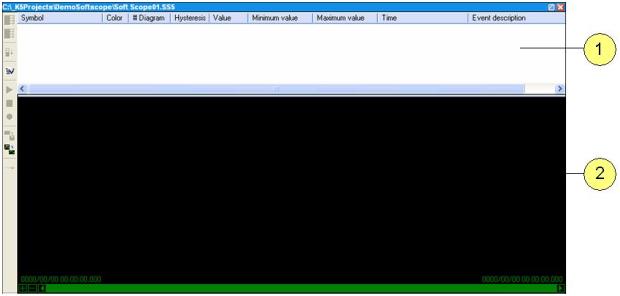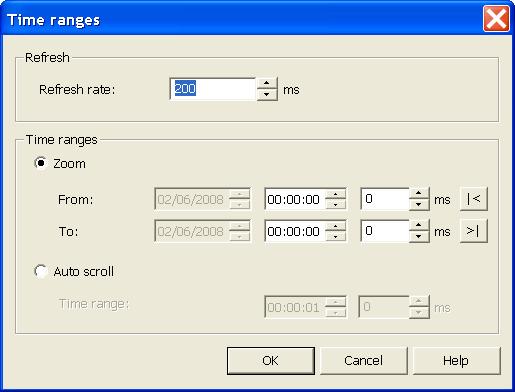
The soft oscilloscope enables you to track the value of boolean or numerical variables and display it in a curve. Spied variables are tracked by the runtime, which detects changes and assign time stamps so that the trend displayed is very accurate.
The soft oscilloscope is available during On Line debugging. It uses the T5 spontaneous protocol (used for binding) over ETHERNET. Thus the soft oscilloscope cannot be used with runtime systems having no ETHERNET connection.
The soft oscilloscope is run from the "Watch" tab of the Workspace window. Use commands of the contextual popup menu to create new "soft scope" configurations. Below is the soft oscilloscope screen:

1- List of variables to be displayed
2- Diagram area (oscilloscope display)
In the diagram area, the user can zoom, explore a particular time range and automatically scroll the diagrams.
The scroll bar behind, represents the current watching time range. The complete width represents the full time since target has started to the current target time.
To add new symbols to be displayed in diagrams, drag and drop them from the variable editor, or double click in an empty line in the list area. These new symbols can be added in both On Line or Off Line modes.
The following pieces of information are configured in the list:
|
Symbol |
Name of the spied variable |
|
Color |
Color used to draw the curve |
|
#Diagram |
Index of
the diagram pane - default is 1 |
|
Hysteresis |
Hysteresis
to apply for change detection of analog values |
|
Value |
The current value of the variable is refreshed in this column |
|
Minimum/Maximum |
Range of the Y axis |
|
Time |
Time and date of the last change |
|
Description |
Free description text |
The following commands are available from the soft oscilloscope toolbar:
|
|
Move the selected variable up or down in the list |
|
|
Sort variables of the list |
|
|
Setup time ranges |
|
|
Start the oscilloscope |
|
|
Stop the oscilloscope |
|
|
Start recording |
|
|
Save record to file |
|
|
Reload record from file |
|
|
Auto-scroll mode (toggle) |
When sampling is active, you can start recording all events from now by clicking on corresponding (red) button. You must specify a “csv” file where samples will be recorded. All events on all symbols will be recorded in this file until you uncheck recording by clicking the button again.
When sampling is inactive, you can save particular parts of the diagrams to the disk. For this, will select the symbol(s) in the list and then zoom the time area to fit the range you want to save. Selected events will be saved in a “.rec” file. Later, you can restore a “.rec” file to the diagram. When user restore his diagrams, only symbols existing in the list will be updated.
The "Setup" button opens the following box for configuring the X-axis of the display:

Two modes are available:
- Zoom mode
- Autoscroll mode
You can choose a specific time area to be displayed with “from” and “to” lines. Buttons near are used to zoom from the first start time and to the current time.
In autoscroll mode, diagrams are scrolled automatically at the refresh rate to display the specified time range. The refresh rate can be increased for better refresh in autoscroll mode (for instance if the time range is long and if there lots of events occur during this period).